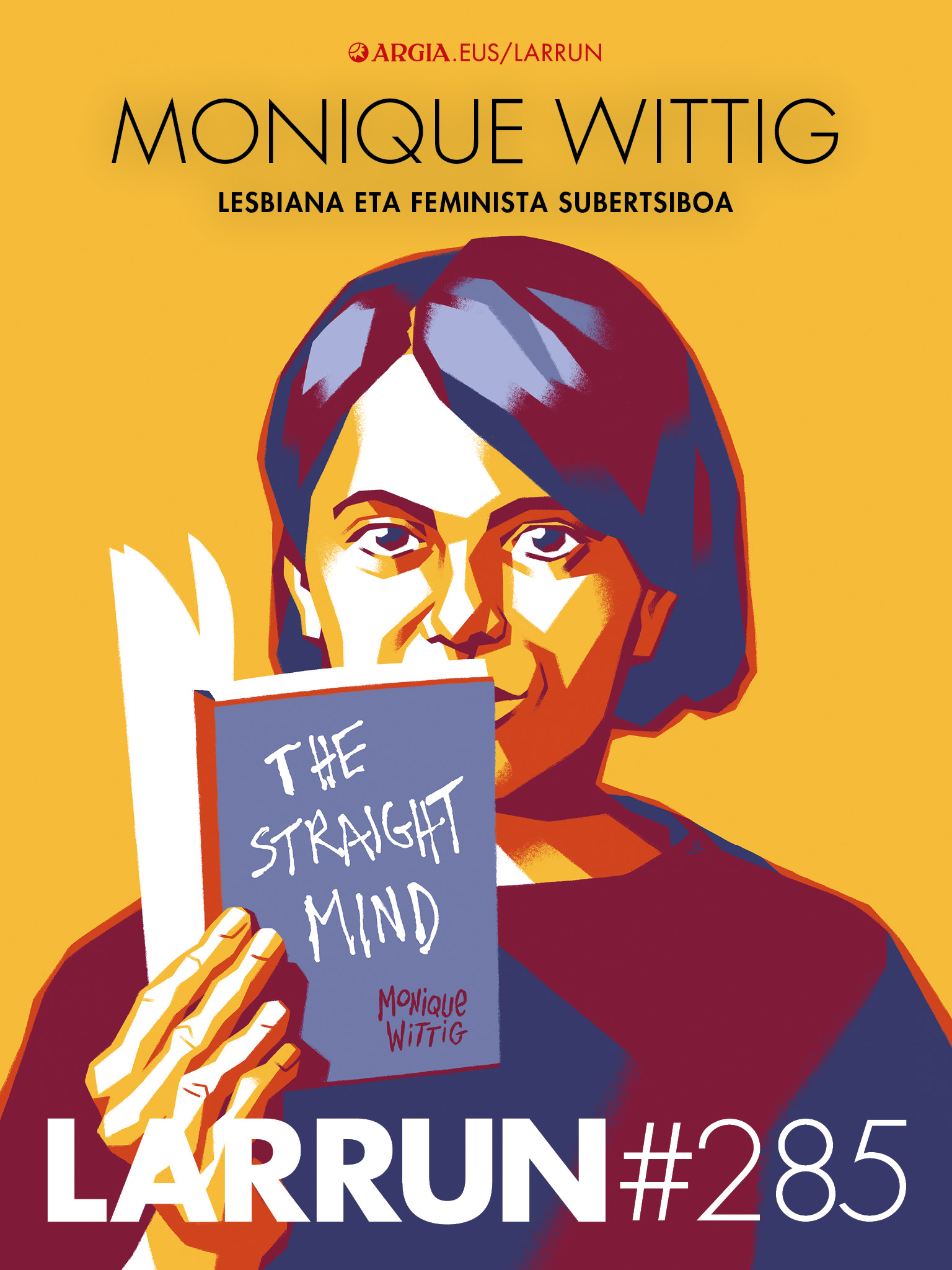"Wittig believes that the obligation of writers is to free the language from the kidnapping of the most powerful"
- Monique Wittig has been studying texts and speeches for some time by Dominique Bourque, professor at the University of Ottawa. In 2000 he presented his thesis "Vers une théorie du contre-texte: La subversion formelle dans l'oeuvre de Monique Wittig". We talk about the literary creation of Wittig, a conversation centered on the relationship of the feminist and lesbian thinker with language and writing.

Monique Wittigen's thought is subversive. The same can be said of his literature.
Despite the 40 years that have passed, its analysis of the great heterosocial system remains subversive, and it is likely that this will continue throughout the life of the system. He says that the "heterosexuality regime", derived from a set of discourses that make up a heterogeneous thought, is a universal system. Through their attempts, it encourages us to look at concrete behaviors that target differentiated social groups, perceived as different. It invites us not to abandon the imagination of new forms of coexistence. I did not accept the message that we have to accept the widespread idea that change is utopian and that there is. Profound changes begin in their idols.
For Wittig, lesbianism highlights the mystification of this regime, which institutionalizes the polarization of the sexes and "complementarity" (through, among others, marriage, family, filiation and socialization). Renouncing the imperative model of the heterosexual couple, highlighting the autonomy of women and turning their backs on the relationship they are required with men, lesbianism threatens the very basis of this regime. Hence lesbians are adhered to in the shade in heterosocial areas.
I think it is important to stress – because we note
this – that Wittig has worked materialistic lesbianism.
His writing is also subversive. What would you highlight?
The originality of Wittig’s writing lies in the parody universalization of the relegated or silenced approach in the usual. This perspective revolution gives a touch of strangeness to the universes known in practice. The world that guides us by the writer is not entirely ours, nor is it entirely the protagonists. It's a world that asks, a world that has a dubious sense of words, a world of lists that divide text, or a world of lists that enter text confidentially. Other stories emerge, if they are echoes of other books, there are novelties of different nature (neologism, hybridization of myths or works, lesbianisation of historical figures or cultural people, etc.). Above all, it gives the floor to the protagonists open to history (children, militants, transvestite lesbians, writers, etc. ), lighten the weight phrases of the speeches and recover the semantic potential of the words in order to reveal the forbidden.
Language
is
a material form, little
or nothing dense or sharp, a continuous battlefield for spirits control
I had a strong awareness of not being a neutral language and writing from there.
It seems that language is transparent, like their crystal. In reality it is a material form, little or nothing dense, which is a continuous battlefield for the control of spirits. The most powerful try to reduce the importance of language and its elasticity, that is, their ability to designate the complexity of the world, so that their interests remain strong. Wittig believes that it is the obligation of the writers to free the language from these kidnappings, especially to regain their ability to see and listen, as well as to stand as a mediator, because language is a subject that can be adapted.
He said it was very difficult to write to a woman, precisely because language is not theirs.
According to Wittig, only if it is a speaker or papagaya of the dominant discourse, the doxa, it is easy to write from a minority point of view, that is, oppressed. Otherwise, the writer must relate to the back work of the analysis of the functioning, uses and consequences of language; the category must question the syntax. Yes or yes, females should be as far away from grammatical gender and gender characteristics as possible, because their function is to limit women to sex to eliminate subjectivity.
Heterogeneous thinking was constantly being erased, even in its literary creation.
Yes. It should be remembered that heterogeneous thinking, as Wittig has represented, is a set of discourses that justify that some social groups take advantage of the underpaid or unpaid work of other social groups, as well as their person (time, care, body, etc.). In his works of fiction he explores the paths of resistance to the heterosocial regime, from the knowledge of history, struggle, flight or reinvention of the world, among others. This is achieved through protagonists aware of their peculiarities and their social position. Inspired by mythical and historical figures (the great Katarina, feminists, Ulises, Safo and their lovers, On Quijote, Dante, Virgile), these characters display a remarkable density and cultural amplitude. For Wittig, rebellious models, knowledge of history and the exploitation of imagination are essential to complement individual and collective consciences. These sensitivities are the basis of revolutionary struggles.
In his works of fiction he explores the ways of resistance to the heterosocial regime, from the knowledge of history, struggle, flight or reinvention of the world, among other things
It's been dedicated to inventing words and altering stories.
Wittig's poetics has two components: the reactivation of language and the inscription in the literature. One way to keep the language alive is to create these neologisms, designed to fight ideological frost. It has the same intention with the updates of historical works; it is situated in literary history, but giving a new direction. In the selection of Cervantes' novel we see a parallel between the troubled, humiliated, considered crazy person and stigmatized lesbians. Like Don Quixotes, materialistic lesbians are prevented from injustice and want to put an end to it. In addition, Cervantes’ novel places us at the beginning of the seventeenth century, when Europe turns its back on the theological vision of the world to guide a reflection on human responsibility towards other human beings and on the path of history. From the lesbian point of view associated with the emancipation of the oppressed one must also read the desire to review this work.
What was the thinker looking for with fiction literature?
By writing works of fiction, writers enrich and sharpen our awareness of the world and its complexity. Wittig entered literature writing fiction. Thus, he was able to explore the potential of languages and literature to shape new conceptions. It has also served to detect blind angles and gaps. The quality of their reflections and analyses has been influenced by their presence in fiction literature. In addition, a broader reader is moved than having been left in a single approach, proposing literary works and essays.

How to explain the low recognition of Wittigen’s rich and innovative work?
Minority perspectives question the basis of the heterosocial regime, so it is not surprising its censorship. They're even more threatening when they come from talented, clear writers. In addition, subversive works are not always welcome because they invite us deeply into our relationship with the world. Absorbing this blow is not a light thing.
L´Opoponax was his first written work at age 29. He received the Medicis prize, entering the world of wholesale literature. Although he received a mention, the essence of the book was not mentioned. Wittig himself warned: "We have a love story between two typical girls (…), this aspect of lesbianism has been tacit." How does that vision explain?
In the French literature of that time there were hardly any lesbians and they were also ignored in society. I relate that silence to that. How can we see what doesn't exist? No nominal? As at present, in the 1970s lesbians were not asked their opinion. We didn't even know who they were because that information endangered their career, and therefore their financial autonomy.
Since
minority perspectives question the basis of the heterosocial regime, censorship is not surprising.
Although not all the works have been read, I am told there is a thread between them.
Characters grow in age and experience, their interests and struggles transform. Let’s look at the novels published in the editorial Minuit: L’opoponax (1964) addresses childhood and subjectivity, as well as the discovery of the world with its silences and lagoons. In Les Guérillères (1969), young feminists face dominant discourses, study social relations and fight for a better world. The intersubjectivity of Le Corps lesbius (1973) is explored through an encounter of love experienced in suffering and pleasure. Finally, in Virgile, where (1985) the challenges and limitations of militantism are addressed through an initiatic journey in full militancy.
As for formal explorations, the work carried out around the subtitles [the grammatical choices decided to eliminate the asymmetry between the sexes, using subtitles that prevent the differentiation of the female class or generalizing the female gender until the elimination of sexual identity] has been very remarkable. On the other hand, we can observe that the literary relationship is increasingly explicit, with the time that passes to the adaptation of complete works (Divina Commedia, On Quijote) from textual quotes taken as incognito (lyric and epic poetry, mythology, bible…). He has done so to illustrate Lesbian's position in the world in a playful way.

In Virgil, where Wittig has a more pessimistic view of the feminist struggle. Didn't I believe more in the feasibility of that lesbian community?
In this work we cause a healthy relaxation, a dose of multiple humor and realism. Inspired by Dante's Divine Commedia, a beautiful encounter between a character of writers named Wittig and catastrophic, staging heterosexual women and that in a hell heterosocial world. They do not share the analysis of the situation, heterosexual women send Wittig several times to bankruptcy and their intention to save them. The conversations between these characters are magnificent and also between Wittig and Manastabal, who like him is a materialistic lesbian. Yes, look at the situation of women from a pessimistic perspective. Progress is not much: they continue to suffer violence; household chores and the responsibility of children remain in their hands; they always run between work and the family, in constant and risky compromises, to ensure financial security. Some are divided between the desire for freedom and the fear of life. However, we also cause hope. We are struck by Manastabal’s clarity and commitment. Despite the harsh conditions, the army of joyful lesbian angels balances the atmosphere.
How can we
see what doesn't exist? No nominal? As at present, lesbian women were not asked their opinion in the 1970s either.
Can we say that queer thinking was not yet corporal, that Wittig already had queer literature?
Since I know Queer theory, movement and literature, I can't associate Wittig with queer. However, I am aware that most of the French activists in this movement proclaim themselves as descendants of Wittig. Perhaps we should define this term in order to deny a clear opinion. I think it is important to stress, because we do too badly, that Wittig has worked materialistic lesbianism. This theory designates and places us in history the exploitation, oppression and ownership of most citizens. Wittig believes that the end of this regime will be obtained from the abolition of gender, not from the multiplication of genders, not from the performance and revision of meanings, but from the reactivation of words and works. Their priority is concrete struggles, not visibility. That is why he says that the gender mark must be removed and not disseminated.
It is 50 years since the publication of Le corps lesbien. Subversive holder for 1973, of course.
It's the most fascinating and original work I like Wittig. It is the work that brings closer the plans of the subject and of writing. It was not recognized in its publication. Maleruski, the bravery of the headline, his irony and his minds have alienated readers instead of appropriating. The absence of corpus lesbians and the absolute silence on lesbians are some of the reasons that justify this work. This violent absence motivated the inversion of language matter, the inversion of the body, of the surface to the depths, with its rhythms and secretions, to make everything appear literally. Like all Wittig's work, in the book of the lesbies Le corps we caused the Trojan horse trying to found the literary territory.
Eire
WHEN: 31 August.
WHERE: Plaza 23 de September.
------------------------------------------------
On Saturday night, the Erandio festivities and the storm have fired the month of August. The concert of the zumaiarra band Eire is announced for 22:00 p.m. Lately the group... [+]
Since we were transferred to Euskal Herria from the prisons of the Spanish State, in the prison of Zaballa we have found many deficiencies in the field of communication. We have fewer and shorter face-to-face contacts, we have had to make visits to the speaker in poor technical... [+]
On August 26, I woke up as if it were a normal Monday, I rose from bed and, with my arms overflowing, I woke up. But as soon as I got to the hallway, I knew that that wasn't one of those monotonous, heartless Monday forever. I found my parents in front of the computer reading the... [+]





















